#columbia faculty
Explore tagged Tumblr posts
Text
María Rivera Maulucci, a professor of Urban Studies at Barnard, spoke out against the arrests.
“The root of word education means to lead out, but how are we leading our students out? In zip ties. Where are we leading students out? To buses? To police stations?” she told the crowd, according to the blog.
Comments such as that — and the general support for the anti-Israel students — left Rory Lancman, the senior counsel of the Brandeis Center for Human Rights Under Law, lamenting his alma mater.
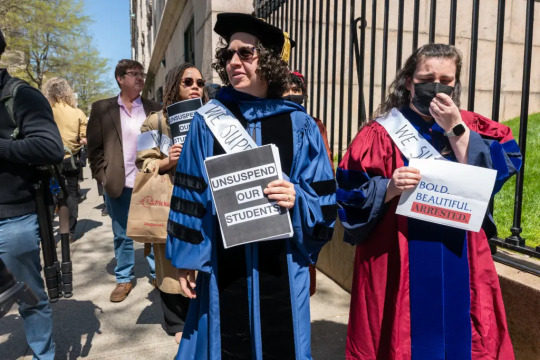
3Columbia University’s faculty is facing backlash after their decision to back students at the anti-Israel demonstration on campus was denounced as “grotesque” by members of New York’s Jewish community.Getty Images
“It’s grotesque that we have professors who can’t discern the difference between hateful, discriminatory and violent rhetoric that violates the university’s anti-discrimination policies and terrorizes a segment of the university community and reasoned free speech and debate,” said Lancman, whose legal advocacy groups works to battle antisemitism.
“What you’re witnessing at Columbia is the anti-Zionist, antisemitic movement at its core.”
Lancman described the protesters as wannabe “fascists” who were trying to get their way “through harassment, intimidation and violence.”
Several Columbia graduate students, who only gave their first names, also questioned the professors’ support for the student protesters.
“I don’t think it was a smart thing for them to do,” Dana, 34, told the Post.

3Professors appeared on the school’s steps to support the right of the “Gaza Solidarity Encampment” to take over campus space and denounce the administration’s decision to have protesters arrested.REUTERS
“The professors siding with them, basically that tells me, ‘OK Columbia is not a place of discourse, it is not [a] place where you can peacefully argue. It’s a place that sides with a very specific student body.'”
Ali, 26, a transfer student from Tel Aviv University, said the faculty walkout made it clear that the professors were not just endorsing the protest at Columbia, but were actively taking part as well.
“There was no reason to believe that they weren’t part of the protest. They joined the movement because they came out and joined the protest,” Ali said.
He added that the protesters at Columbia have “made no effort to distance themselves from pro-terrorism positions,” calling the demonstrations “disturbing.”
Omer, another graduate student who was putting up pictures of the remaining hostages kidnapped by Hamas, said he was also troubled by the professors’ walkout.
88 notes
·
View notes
Text
Over 100 faculty members from Barnard and Columbia gathered on Low Steps at 2 p.m. Monday for a “Rally to Support our Students and Reclaim our University.”
aculty in the Barnard and Columbia chapter of the American Association of University Professors voiced support for students’ freedom of assembly and condemned the suspensions and arrests of “peaceful” protesters. At around 2:40 p.m., faculty members marched in a procession toward Barnard to deliver a letter to Barnard President Laura Rosenbury and Dean Leslie Grinage demanding that Barnard lift all student suspensions. As of Tuesday, Barnard has suspended at least 53 Barnard students.
“Barnard members of the AAUP are shocked and outraged at the illegitimate arrest, suspension, and eviction of over 50 Barnard College students who are engaging in a peaceful protest on the designated free speech zone of Butler lawn,” the letter states. “These actions have disrupted our ability to teach and our students’ ability to learn far more than any protest has.”
#Columbia University#students#faculty#protest#Gaza Solidarity Encampment#GazaGenocide#repression#censorship#solidarity#AAUP
17 notes
·
View notes
Link
Forbidden speech
#Canada#education#University of British Columbia#Palestine solidarity#censorship#repression#termination#dismissal#authoritarianism#faculty members#resistance
0 notes
Text
No one has been fired or expelled over any of this btw.
Jewish Columbia students were chased out of dorms, spat on, and pinned against walls: damning report
By Matthew Sedacca
Published Aug. 31, 2024, 3:44 p.m. ET
Jewish students at Columbia University were chased out of their dorms, received death threats, spat upon, stalked and pinned against walls, as the Ivy League school devolved into a cesspool of antisemitic hate in the wake of Hamas’ Oct. 7 murderous raid on Israel.
The new and disturbing details emerged from the lengthy, 91-page document released Friday by the school’s faculty-led antisemitism task force, which revealed the extent to which the hate permeated the institution.
“Students described being shoved, pushed to the ground, berated for showing support for Zionist causes, and watching Israeli flags burned,” the task force’s authors wrote.
Jewish and Israeli students at Columbia University endured a months-long nightmare of harassment, violent threats and assaults after Oct. 7.
Getty Images
“They recounted seeing drawings of swastikas in their dorms, students yelling pro-Hamas chants, and being denied access to public spaces and opportunities simply because they were Jewish or Israeli.”
Testimony from nearly five hundred Columbia students informed the report, which found visibly observant Jews had been pinned to the wall and had their jewelry ripped off while coming and going from synagogue. Others recounted being spat on and having been called ethnic slurs on campus.
One student, who had installed a mezuzah on her dorm’s doorway prior to the Israel-Hamas war, was forced to move out after people were pounding her door throughout the night beginning in October, demanding she explain the Jewish state’s war in Gaza.
“If I walk on campus right now with my star out or kippah or say ‘am Yisrael chai,’ I could start World War III,” one anonymous student’s testimony read.
Instructors tasked with guiding and mentoring students instead contributed to the sense of isolation and unease among Jews and Israelis on campus, according to the report.
Students recalled being pushed to the ground and watching Israeli flags being burned.
One faculty member leading a class that delved into the Israel-Hamas conflict called a student who previously served in the IDF a murderer. Another professor extensively said a pair of Jewish donors to the university had “laundered” “dirty money” and “blood money.”
During the spring, as protests and encampments roiled the school’s Morningside Heights campus, protesters, including outsiders and members of the university community, bellowed death threats at Jewish students. Demonstrators who held Israeli flags, meanwhile, recalled being assaulted.
“There is a sense of personal threat, and we keep looking over our shoulders,” master’s student Omer Lubaton Granot, an Israeli veteran and father of a toddler, told an Israeli radio station in the wake of protesters seizing the academic building Hamilton Hall in April.
Councilman Eric Dinowitz (D-Bronx) described the students’ testimonies as “horrifying — and not surprising.”
“These are stories we’ve been hearing about, as the report says, even before the encampments,” he told The Post, adding that antisemitism had been on the rise at college campuses even before Oct. 7
“Without any sort of consequence [for students and faculty] this sort of behavior will continue
The task force offered several recommendations to address the issues detailed in the voluminous report, including improved anti-bias training for students and staff along with a new system for reporting complaints about antisemitism.
The report was issued just days before Columbia’s fall semester begins and less then three weeks after embattled university president Minouhce Shafik suddenly resigned, citing the “period of turmoil” that marred her brief tenure at the school.
Interim President Katrina Armstrong called the disturbing incidents “completely unacceptable” before rattling off new initiatives at the university aligning with the panel’s recommendations.
“This is an opportunity to acknowledge the harm that has been done and to pledge to make the changes necessary to do better and to rededicate ourselves, as university leaders, as individuals, and as a community, to our core mission of teaching and research,” she said
#expel all those students#fire all those faculty#jumblr#antisemitism#leftist antisemitism#columbia#hamas#hamas supporters#columbia university
201 notes
·
View notes
Text
The Elite College Students Who Can’t Read Books
Nicholas Dames has taught Literature Humanities, Columbia University’s required great-books course, since 1998. He loves the job, but it has changed. Over the past decade, students have become overwhelmed by the reading. College kids have never read everything they’re assigned, of course, but this feels different. Dames’s students now seem bewildered by the thought of finishing multiple books a semester. His colleagues have noticed the same problem. Many students no longer arrive at college—even at highly selective, elite colleges—prepared to read books.
This development puzzled Dames until one day during the fall 2022 semester, when a first-year student came to his office hours to share how challenging she had found the early assignments. Lit Hum often requires students to read a book, sometimes a very long and dense one, in just a week or two. But the student told Dames that, at her public high school, she had never been required to read an entire book. She had been assigned excerpts, poetry, and news articles, but not a single book cover to cover.
[...] Twenty years ago, Dames’s classes had no problem engaging in sophisticated discussions of Pride and Prejudice one week and Crime and Punishment the next. Now his students tell him up front that the reading load feels impossible. It’s not just the frenetic pace; they struggle to attend to small details while keeping track of the overall plot.
No comprehensive data exist on this trend, but the majority of the 33 professors I spoke with relayed similar experiences. Many had discussed the change at faculty meetings and in conversations with fellow instructors. [...] Daniel Shore, the chair of Georgetown’s English department, told me that his students have trouble staying focused on even a sonnet.
Failing to complete a 14-line poem without succumbing to distraction suggests one familiar explanation for the decline in reading aptitude: smartphones. Teenagers are constantly tempted by their devices, which inhibits their preparation for the rigors of college coursework—then they get to college, and the distractions keep flowing. “It’s changed expectations about what’s worthy of attention,” Daniel Willingham, a psychologist at UVA, told me. “Being bored has become unnatural.” Reading books, even for pleasure, can’t compete with TikTok, Instagram, YouTube. In 1976, about 40 percent of high-school seniors said they had read at least six books for fun in the previous year, compared with 11.5 percent who hadn’t read any. By 2022, those percentages had flipped.
[...] Mike Szkolka, a teacher and an administrator who has spent almost two decades in Boston and New York schools, told me that excerpts have replaced books across grade levels. “There’s no testing skill that can be related to … Can you sit down and read Tolstoy? ” he said. And if a skill is not easily measured, instructors and district leaders have little incentive to teach it. [...] The pandemic, which scrambled syllabi and moved coursework online, accelerated the shift away from teaching complete works.
[...] But it’s not clear that instructors can foster a love of reading by thinning out the syllabus. Some experts I spoke with attributed the decline of book reading to a shift in values rather than in skill sets. Students can still read books, they argue—they’re just choosing not to. Students today are far more concerned about their job prospects than they were in the past. Every year, they tell Howley that, despite enjoying what they learned in Lit Hum, they plan to instead get a degree in something more useful for their career.
[...] For years, Dames has asked his first-years about their favorite book. In the past, they cited books such as Wuthering Heights and Jane Eyre. Now, he says, almost half of them cite young-adult books. Rick Riordan’s Percy Jackson series seems to be a particular favorite.
3K notes
·
View notes
Text
keep boycotting. keep protesting. keep talking.
"As Columbia University’s administration threaten the mass suspension of hundreds this afternoon, students and faculty in the Gaza liberation encampment are remaining steadfast and collectively refusing to leave. In their own words, suspension for Gaza is the highest honor. May we all learn from their example." from Palestinian Youth Movement, 30/Apr/2024:

#columbia university#keep talking about palestine#dont stop talking about palestine#keep protesting#protest for palestine#palestine#free palestine#gaza#free gaza#from the river to the sea palestine will be free#i stand with palestine#rafah#save rafah#human rights#social justice
6K notes
·
View notes
Text

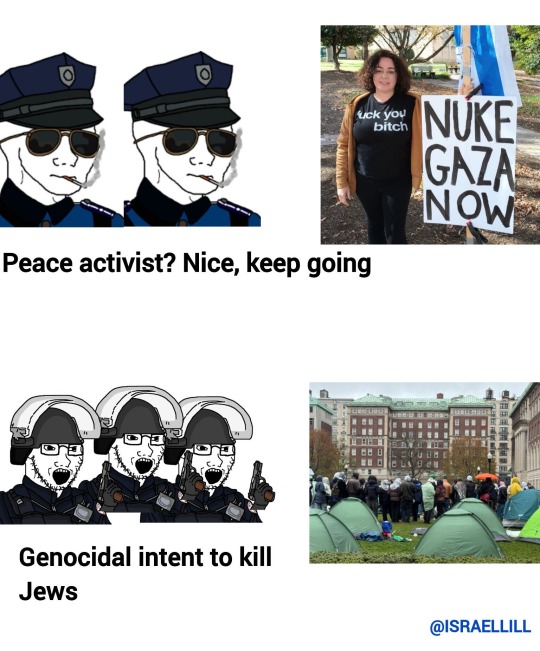
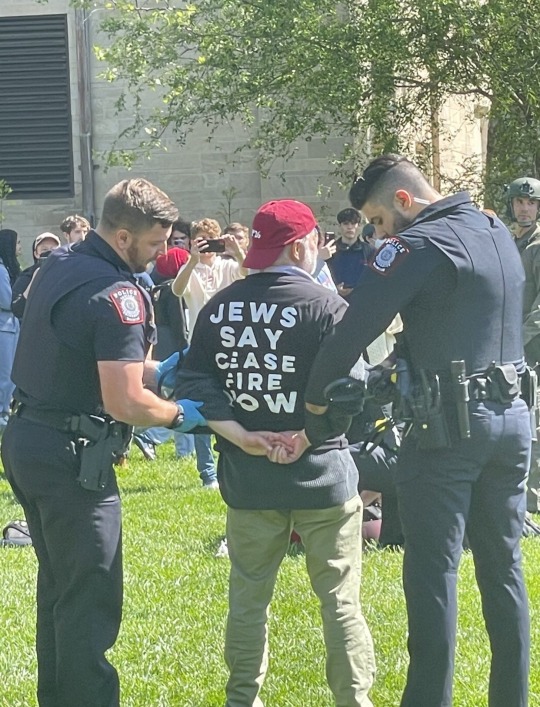
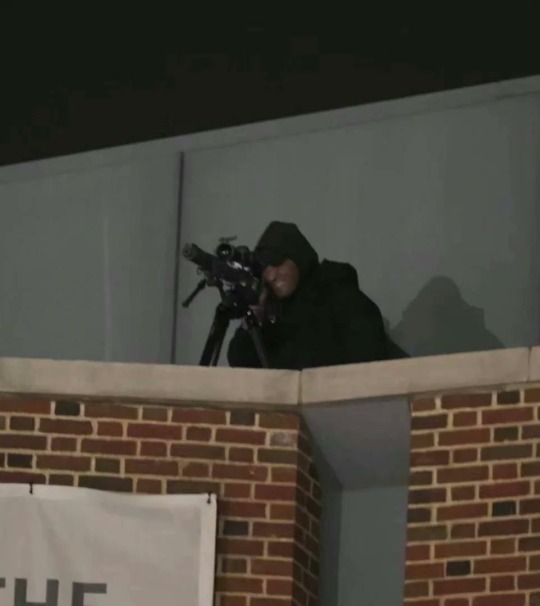
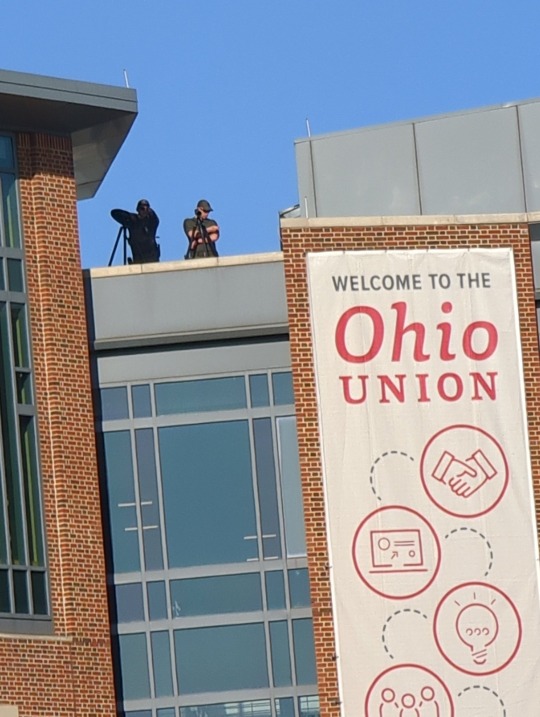
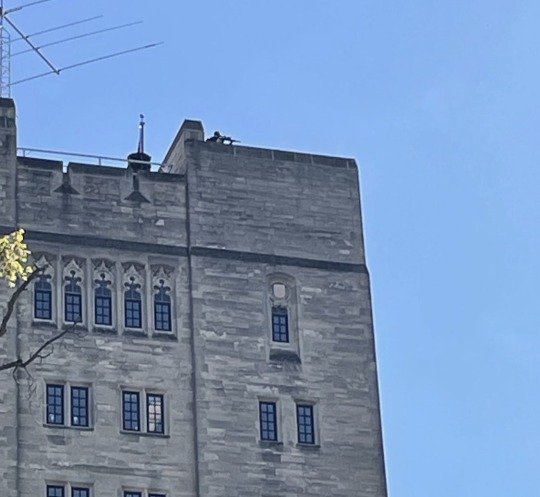
Peaceful anti war/pro Palestine protestors are being beaten and attacked by police with snipers on rooftops. Hundreds of Jewish students and faculty members being arrested.
Vs
Actual Nazis on the columbia university campus protesting.
If you’re Jewish in America this should be pretty terrifying. America protects its fascist that includes Zionists.
3K notes
·
View notes
Text
Columbia Encampment: “We support Hamas and the destruction of Israel!”
Jews and multiple faculty at Columbia: “This… seems dangerous & violent?”
everybody else for months: “Psshhh no the Columbia encampment it’s just a peaceful anti-war protest! They just want Columbia to divest from the Israeli government!”
Columbia encampment: “In no uncertain terms, we are trying to extend the success of October 7th to America in the form of unrest and violence to bring about the total collapse of our University & eradicate America.”
897 notes
·
View notes
Text
The website of the Columbia Law Review, one of the oldest and most prestigious legal journals in the country, has been down since Monday. At the time of this broadcast, ColumbiaLawReview.org shows a static homepage informing visitors that the site is “under maintenance.” Well, that’s not exactly true. In a stunning move, the board of directors of the Columbia Law Review decided to take down the website after the publication’s student editors refused the board’s request to halt the publication of an academic article written by Palestinian human rights lawyer Rabea Eghbariah titled “Toward Nakba as a Legal Concept.” Student editors at the Columbia Law Review say they were pressured by the journal’s board of directors to halt publication of the piece. They refused the request and published the piece online Monday morning. In response, the board, which is made up of faculty and alumni from Columbia University’s law school, shut down the law review’s website. After the website was taken down, student editors uploaded the article to a publicly accessible website, where it’s gone viral. The article begins, “The law does not possess the language that we desperately need to accurately capture the totality of the Palestinian condition. From occupation to apartheid and genocide, the most commonly applied legal concepts rely on abstraction and analogy to reveal particular facets of subordination. This Article introduces Nakba as a legal concept to resolve this tension,” unquote. The article is written by Rabea Eghbariah, a human rights lawyer completing his doctoral studies at Harvard Law School. Last November, the Harvard Law Review refused to publish a similar, shorter article it had solicited from Rabea, even after it was initially accepted, fully edited and fact-checked. In both cases, the article would have been the first time that either the Harvard Law Review or the Columbia Law Review had ever published a Palestinian legal scholar.
The video interview with Eghbariah, a transcript of the interview, and a full copy of the censored article, can be found on Democracy Now (5th of June, 2024).
Here's also a direct link to Eghbariah's article:
“Toward Nakba as a Legal Concept”
#from the river to the sea palestine will be free#palestine#israel#gaza#zionism#1948 nakba#campus protests
1K notes
·
View notes
Text
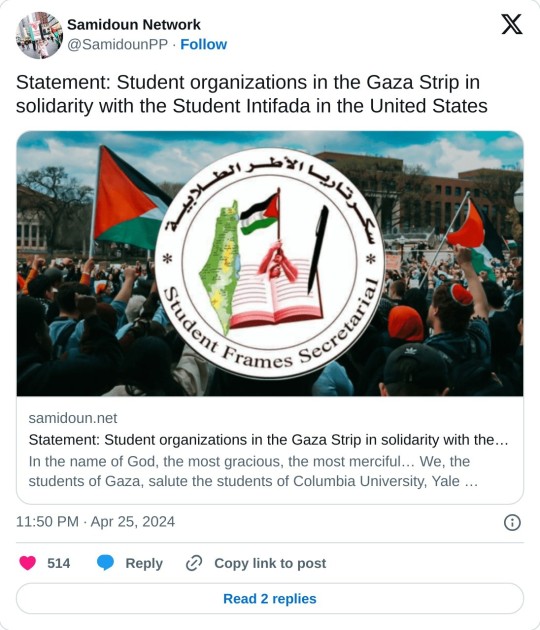
Statement: Student organizations in the Gaza Strip in solidarity with the Student Intifada in the United States
In the name of God, the most gracious, the most merciful… We, the students of Gaza, salute the students of Columbia University, Yale University, New York University, Rutgers University, the University of Michigan, and dozens of universities across the United States who are rising up in solidarity with Gaza and to put an end to the Zionist-U.S. genocide against our people in Gaza. As we remain under the bombs of occupation, resisting Nazi genocide, grieving for our martyred colleagues and faculty, and witnessing the destruction of our universities, we welcome the examples of solidarity offered by students facing arrest, police violence, suspension, eviction, and expulsion in order to demand that their universities end their complicity in the Zionist-U.S. genocide and renounce their support for the occupation and the war profiteers that arm it. We have seen hundreds of students arrested across the United States as they work to transform their universities into “Popular Universities for Gaza.” Students, faculty, and staff are disrupting university operations and making clear that while universities in Gaza are being bombed, university business cannot continue as usual in the United States. These actions come as university administrations collaborate with members of Congress to discredit conscientious student activists and faculty, expel students, ban events, shut down student organizations such as Students for Justice in Palestine, and condemn activists working to end the Nazi genocide. At the same time, these same universities invest in the same companies that profit from the continued sale of weapons to the Zionist regime to continue its genocidal offensive. Our students – and our educational system as a whole – in occupied Palestine are subjected to ongoing genocidal aggression: our universities destroyed and bombed, our student organizations banned, and our student leaders subjected to torture, assassination and mass imprisonment. However, in Palestine and around the world, the student movement has always been a driving force of our struggle for liberation. When we see videos and images from American universities today, we are reminded of our history of student struggle as well as the student uprisings of 1968, which challenged imperialism from Vietnam to Palestine and reshaped the face of Europe and the United States. Now, in 2024, the student movement is once again leading the way. From here in Gaza, we see you and salute you. Your actions and activism matter, especially in the heart of the empire, in the United States. As members of Congress agree to provide $26 billion in additional weapons to bomb our people and continue the Zionist-U.S. genocide, you are taking meaningful action to shut down the war machine on your campuses. It is clear that a new generation is rising that will no longer accept Zionism, racism and genocide, and that stands with Palestine and our liberation from the river to the sea. Your global student solidarity is breaking boundaries, and it is time to smash the US imperialist war machine. From Gaza to Columbia, to Ann Arbor and Berkeley, our hands are joined to end Nazi genocide and achieve our collective liberation.
#yemen#jerusalem#tel aviv#current events#palestine#free palestine#gaza#free gaza#news on gaza#palestine news#news update#war news#war on gaza#students for justice in palestine#palestinian students#columbia university#gaza genocide#genocide#intifada
2K notes
·
View notes
Text
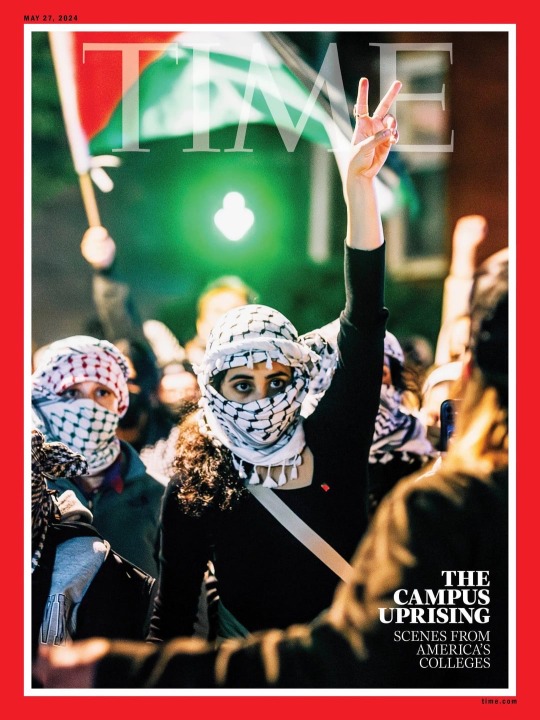
“I'm observing such a huge gap between different social groups that I didn't even realize were different. I, you know, most of my friends are in the media. A lot of my journalist friends are just much better informed.
A lot of them have had experience reporting in Israel, Palestine, and are quite critical of both Israel and the antisemitism narrative. Then, like, my wife is a lawyer, and her circle is a little bit different, right? It's not dominated by media people, like people in the law or in other professions seem to be broadly much more kind of taken by the sense of profound insecurity and shift in the American Jewish experience.
I think we sort of see different things, for example, when we watch the hearings in Congress on antisemitism on campus.
The university presidents, of which there have now been two hearings, one with three presidents, one with the president of Colombia, and there will be many, many more. And what I see is a right-wing campaign against higher education that is weaponizing antisemitism as an idea, right? Not antisemitism as a practice.
And what they see is, with the possible exception of the president of Colombia, is people who represent institutions or lead institutions that they feel an affinity with, often institutions that they graduated from, who are not standing up for them. Which I find that viewing of those hearings somewhat shocking because people seem to be turning off their critical faculties. But people, intelligent, educated, politically astute people don't turn off their critical faculties unless they're scared.
So I think the underlying fear is real. But just because it's real, it doesn't mean it's justified.
I think a factual account of what we're seeing on campuses now is that this generation of Americans is far more critical of Israel than their parents' generation. And this is true of both Jews and non-Jews. I think that they look at information available to them and they see a 57-year brutal illegal occupation.
And they don't understand how it's possible that their parents and the politicians that their parents support and the politicians who come and give commencement addresses and all that other stuff that I can say about politicians, how it is possible that these people support that state? I think that is an entirely understandable view. It also reflects a huge generation gap.
I think some of those young people are assholes, and some of them are antisemites. I think it's a small minority of the protesters, and it is not actually part of the critique. The protesters' demands, the protesters' organizing beliefs are not in any way or shape antisemitic.
And then there are Jewish students who were brought up Zionist, who were brought up to identify strongly with the state of Israel, who are, I think, a little bit like my cousin in the settlements again. They see these protests, and even probably the participation of their fellow Jewish students in these protests, as threatening their core identity, as threatening their ties to their families, as threatening everything that they were taught for the first 18 years of their lives is true. And of course they feel rattled, of course they feel unsettled, of course they feel threatened.
Like, wouldn't you, if you felt that everything you had believed in was being turned on its head, and if you, by apparently reasonable people? And so you have a couple of options. One is to look at what the protestors are saying, to engage with the facts, to engage with the critique of everything you've ever believed.
There was a terrific, George Curran's podcast a couple of weeks ago with three Columbia students, one of whom sort of narrated that kind of trajectory, getting to university and finding this stuff out and having their mind blown. That's a very difficult path, and it's a very difficult path, especially if you are, say, a first year student in 23, 24.
And then there's the easier path of staying integrated in your community, in your beliefs, and saying this is antisemitic.
Because unfortunately the things that the protestors are talking about are so horrible that you can't say, okay, let's agree to disagree, that you can't hold both of these things in your mind at the same time.
You can't continue to hold your family's uncritical, long-standing support of Israel, and an understanding of what is happening in Gaza and the occupation that has preceded the war in Gaza.
So yeah, of course they feel rattled. That doesn't mean that they're being surrounded by antisemitism.”
—Masha Gessen, the descendant of Holocaust survivors, discusses campus protests (part 3 of 3)
#politics#palestine#israel#masha gessen#student protests#campus protests#columbia university#anti zionism ≠ antisemitism#weaponized antisemitism#weaponized zionism#identity politics#idpol#ethnic cleansing#genocide#israel is a terrorist state#israel is an apartheid state#gaza#rafah#antisemitism#islamophobia#🇵🇸#college protests
538 notes
·
View notes
Text
How Trump seeks to destroy the four major pillars of resistance
But we lose only if we stop fighting
ROBERT REICH
JAN 10
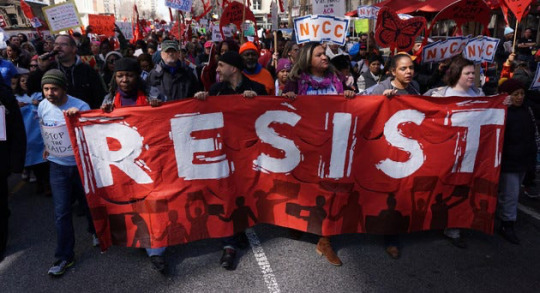
Friends,
Trump and his MAGA allies are already targeting the four major pillars of resistance to Trump during his first term.
As we prepare for Trump’s second regime — which promises to be far worse than the first — it’s important to do what we can to protect and fortify these four centers of opposition.
1. Universities
University faculties are dedicated to finding and exposing the truth — which has often meant calling out Trump’s lies. But Trump has warned that he’ll change the criteria for university accrediting in order to force university faculties into line.
In a campaign video, he said, “Our secret weapon will be the college accreditation system … When I return to the White House, I will fire the radical left accreditors that have allowed our colleges to become dominated by Marxist Maniacs.”
Authorized by the federal government, these accreditors are essential to college operations. If a college isn’t accredited, it can’t get federal funds.
Trump’s Project 2025 calls for replacing the current system of independent, nonpartisan accreditors with more politically pliable state accreditors. This would have disastrous effects.
Many of the worst educational gag orders at the state level, along with DEI bans and faculty tenure bans, have been voted down or toned down because state legislators realized they were putting their schools’ accreditation status in jeopardy. If Project 2025’s recommendations are adopted, that guardrail disappears.
Trump has also threatened to increase taxes on university endowments.
Republicans in Congress believe they were instrumental in getting the presidents of Columbia, the University of Pennsylvania, and Harvard to resign over their alleged failures to stop protests against Israel’s bloodbath in Gaza. Some are eager to resume their attacks on major universities.
2. Nonprofits
America’s nonprofits have been at the forefront of efforts to protect the environment, voting rights, and immigrants’ rights. Trump and his allies are seeking to stop nonprofit activism.
The Republican House has already passed a bill that would empower the Treasury to eliminate the tax-exempt status of any nonprofit it deems to be supporting terrorism. An identical or similar bill could come across Trump’s desk after being reintroduced in the next Congress.
The legislation doesn’t distinguish between foreign and domestic terrorism — whether real or imagined — thereby making it easier for Trump’s authorities to intimidate nonprofit personnel and donors.
We’ve already seen something like this at the state level. In Texas, state authorities have attempted to shut down charities that assist immigrants. Indiana Attorney General Todd Rokita has launched a probe of nonprofits, including the God Is Good Foundation, that have allegedly conspired to bring noncitizens to the state.
3. The media
I’ve been a critic of the mainstream media’s tendency to give “both sides” credence even when one side is clearly in the wrong and to “sanewash” some of Trump’s and his enablers’ rants.
But journalists are an important bulwark against tyranny — which is why Trump and his allies are seeking to intimidate news outlets that have criticized or questioned Trump.
The flurry of defamation lawsuits — such as Trump launched against ABC (and ABC caved to) and the Des Moines Register — is the latest sign. Trump and his allies have also discussed revoking networks’ broadcast licenses and eliminating funding for public radio and television.
Kash Patel, Trump’s nominee to head the FBI, has threatened to “take on the most powerful enemy that the United States has ever seen, and no it’s not Washington, D.C., it’s the mainstream media and these people out there in the fake news. That is our mission!”
Already social media platforms such as Musk’s X and Meta’s Facebook and Instagram have caved to Trump, allowing vicious authoritarian lies to be magnified unimpeded.
4. Organized labor
In the 1950s and 1960s, labor unions were viewed as a source of countervailing power because of their activism on behalf of the working class and their significant political clout.
In those days, a third of workers in the private sector were union members. But today, only 6 percent of private-sector workers are union members, and it’s far from clear that organized labor will be an active source of resistance to Trump. (If government workers are included, the percentage of American workers who are members of unions is around 10 percent.)
Trump has warned organized labor that he will oppose their efforts to organize. The president of the Teamsters Union even appeared at the National Republican Convention in support of Trump.
***
Each of these centers of resistance to Trump has been a powerful source of truth-telling in America. It’s no surprise that all have been targeted by Trump and his allies.
We need to be vigilant and do what we can to protect and fortify them. Remember: We lose only if we stop fighting.
131 notes
·
View notes
Link
Will go down in infamy
#student activism#Palestine solidarity#Columbia University#Gaza genocide#faculty#unions#black pastors#administration#repression#censorship#militarized police#brutality#violence#revolution#Biden#denunciation#complicity
0 notes
Text
Academics and scholars have vowed to boycott Columbia University over its repressive policies against protesting students in shocking scenes that have sparked a wider student movement for Palestine across the US.
Over the past 24 hours, student encampments have mushroomed in colleges - on the east coast, in particular - with more anticipated to begin over the next few days. Middle East Eye is aware of at least two other universities that are planning similar encampments which have not been announced yet.
Student encampments demanding divestment from companies involved in Israel's occupation of Palestinian land and "genocide" in Gaza have popped up at the Massachusetts Insitute of Technology (MIT); Tufts and Emerson in Boston; New York University and The New School in New York City; Vanderbilt in Nashville, Tennessee; Yale University in Connecticut; University of California-Berkeley; The University of Michigan; Washington University in St Louis; and The University of North Carolina at Chapel Hill.[...]
The targeting of students, the attacks on academic freedom and the policing of speech at the university from administrators has also drawn condemnation from several academics and scholars with ties with Columbia.
On Monday, academic Marc Lamont Hill, presidential professor at CUNY, said he would be pulling out of his scheduled lecture from Columbia over the ongoing repression at the university.
Faculty at Columbia and Barnard College on Monday staged a walkout in support of students.
Hours earlier, the Graduate Center Program in English announced a full academic boycott of Columbia and Barnard College "until they reinstate suspended students and respond to their demands: transparency, divestment, liberation".
Several others have released public statements cutting ties with the prestigious university.
22 Apr 24
406 notes
·
View notes
Text
Happening now: Massive walkout of faculty and students at Columbia University in solidarity with the students protesting for Palestine
#colombia#palestine#gaza#free palestine#israel#jerusalem#i stand with palestine#فلسطين#free gaza#israel is a terrorist state#israeli war crimes
529 notes
·
View notes
Text

Day One: University of Texas Austin Students Take the Lawn
https://crimethinc.com/UTApril24
On April 24, students, faculty, and community members assembled on the campus of the University of Texas at Austin to demonstrate against the complicity of the university administration in the ongoing genocide in Gaza. Fearing a repeat of the upheavals that have taken place at Columbia University and elsewhere around the country, campus authorities mobilized a massive number of police in response. Yet despite arrests and violence, the demonstrators ultimately outlasted and outmaneuvered the police. In this report, participants describe what they learned.
254 notes
·
View notes